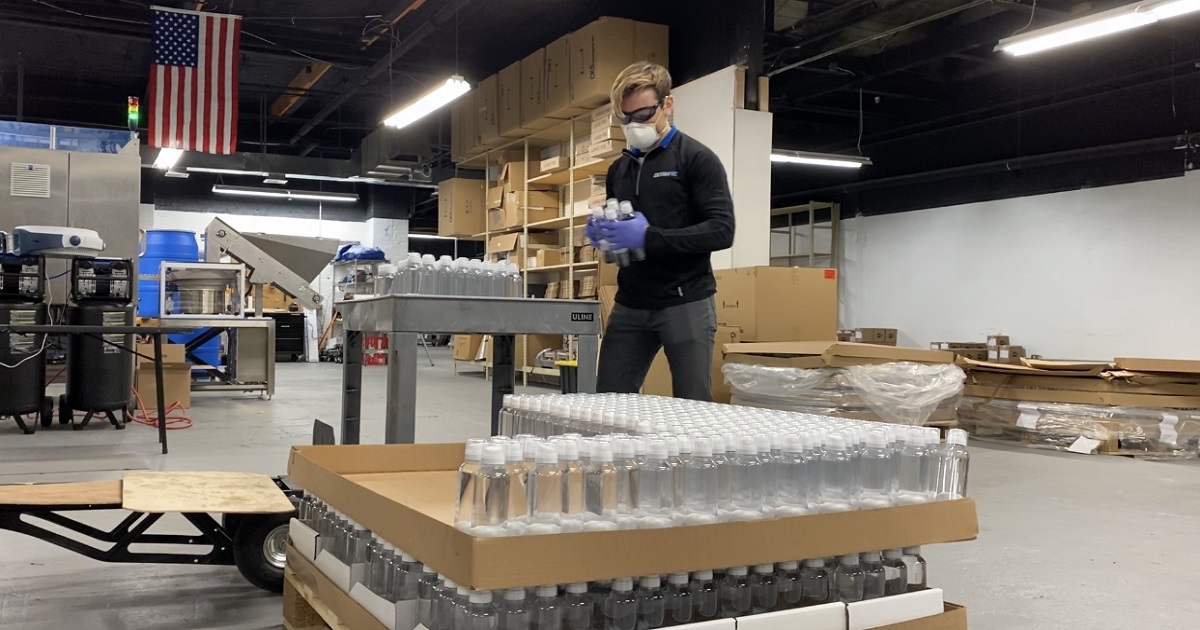‘When There’s a Problem, There’s an Opportunity’

At face value, craft spirits and a stain repellent spray don’t have much in common.
And yet, Matt Nuernberger MBA ’10, cofounder of GrandTen Distilling, and David Zamarin ’19, founder of DetraPel®, now have a common mission. Both entrepreneurs have recently pivoted their businesses in response to COVID-19. In a matter of weeks, they have created new products and partnerships, keeping their teams employed and putting much needed hand sanitizer and disinfectant into the market.
From Spirits to Sanitizer
“Hand sanitizer uses ethanol, which is the alcohol we use to make spirits,” says GrandTen’s Nuernberger. He and his team have produced more than 700 gallons of hand sanitizer since late March. GrandTen’s customer base has changed too; their hand sanitizer is going to health centers, retirement centers, and front line workers like EMTs and police.
So far, customer response has been very positive, but Nuernberger still faces challenges. “Normally, we charge $150 for a case of gin. A gallon of hand sanitizer uses the same amount of alcohol, but sells for barely a third the price. Ethically, there’s no way I could charge full price so our margins are a lot tighter.”
Launching DetraPel’s Disinfectant
For his part, Zamarin has been working around the clock to launch DetraPel’s new coronavirus-killing ecoCleaner and Disinfectant.
“A month and a half ago, we thought business might take a turn so we pivoted to research cleaner and disinfectant products. The entire team transitioned to focus on getting everything ready, from R&D to marketing to EPA registration in 2-3 weeks,” said Zamarin.
“David never ceases to amaze me,” says Undergraduate Dean Ian Lapp. “He is passionate, hard-working, humble, and truly entrepreneurial. His ability to retool an entire line overnight is the embodiment of the action-oriented approach we teach at Babson.”
DetraPel normally sells protective sprays for furniture, clothing, and shoes, and does everything in-house at their facility in Framingham, MA. This pivot to disinfectant meant repurposing the manufacturing line, and making a significant capital investment in machinery.
Now that they’re set up, DetraPel is producing 80,000 bottles of disinfectant each week.
“The response from the market has been phenomenal,” says Zamarin. DetraPel is now a procurement provider for MA, CT, RI, NH, and CA, forming B2B partnerships, and working with government to donate to first responders.
“We definitely did not expect this, which is why we’re working 7 days a week just to fill backorders.”
“You have to understand that the whole dynamic of your business can shift fast.”
Matt Nuernberger MBA’10, cofounder of GrandTen Distilling
Lessons Learned
Both Nuernberger and Zamarin emphasized the importance of agility in navigating the current climate.
“You have to understand that the whole dynamic of your business can shift fast,” says Nuernberger.
His advice? Focus on the things you can control. “A government mandate is outside of your control—don’t beat yourself up if you can’t control it,” he says.
“When there is a problem, there’s an opportunity to help and be part of the solution,” adds Zamarin. “It’s nothing new, but it’s proven quite true.”
Nuernberger’s mantra these days is all about finding ways to say yes, while keeping revenue flowing. When the Governor’s non-essential business announcement closed GrandTen’s cocktail bar, he gave a lot of thought to how to continue without a physical storefront.
“One thing we’re doing differently now is bottling cocktails to go,” he says. “We transformed the ‘in a glass’ experience people enjoyed at the cocktail bar and now it’s an ‘in a bottle’ experience.”
Customers call in their order, which is blended and packaged on the spot with fresh juices. “It’s not meant to sit in the back of a liquor cabinet for years,” says Nuernberger. “It’s meant to be in the fridge and enjoyed within days.”



